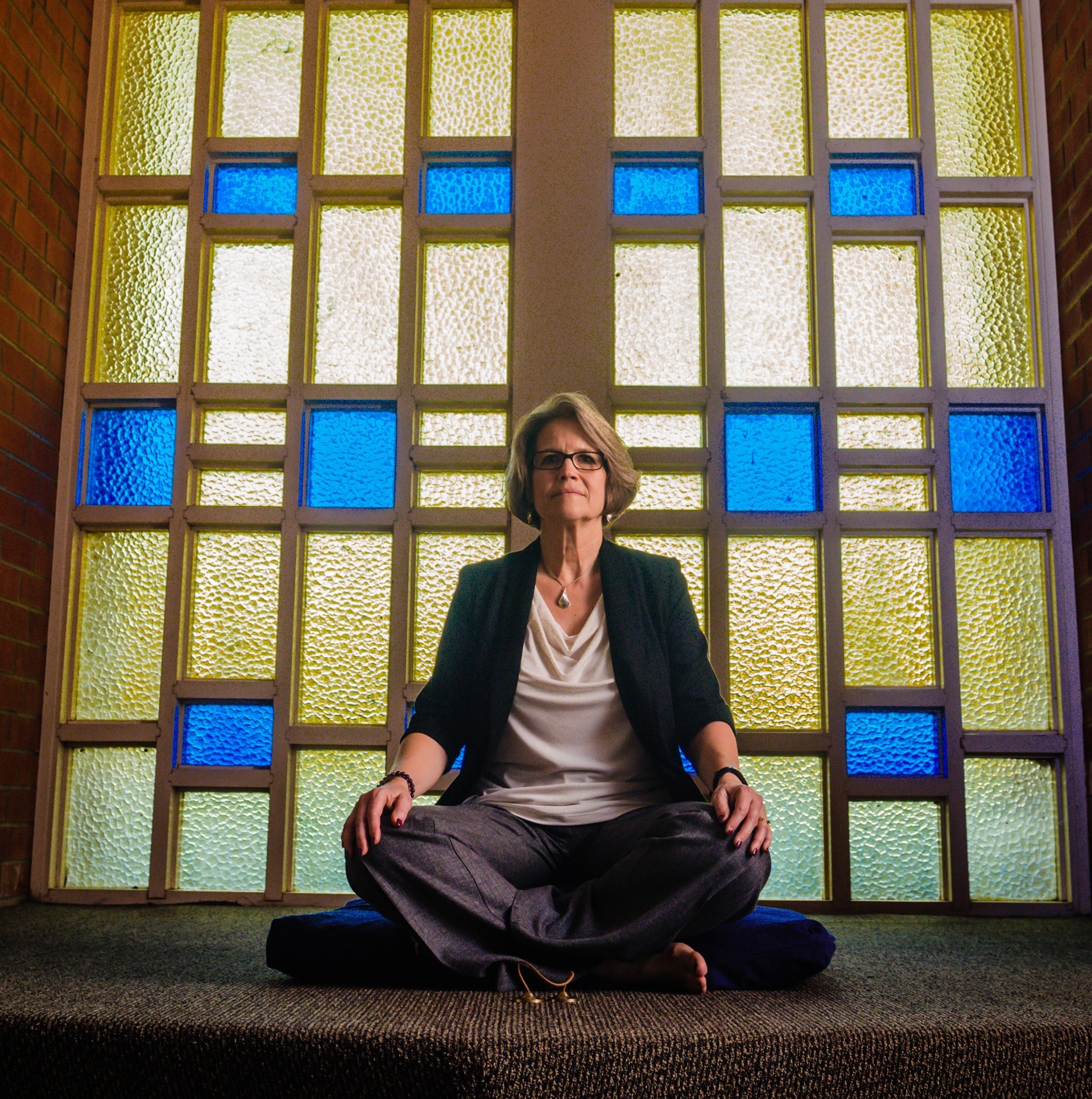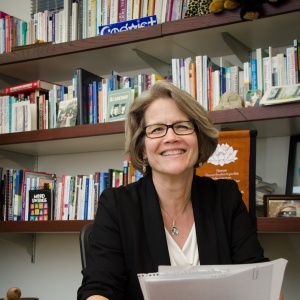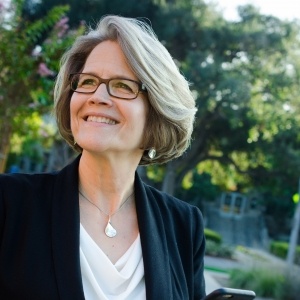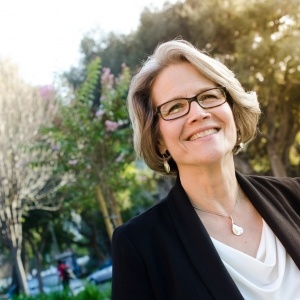Teaching in the Moment
Sometimes there was a tension in the room, with someone not in agreement with a plan or a decision. Other times, it was just the way she wanted to start her meetings.
May 8, 2015
Sometimes there was a tension in the room, with someone not in agreement with a plan or a decision. Other times, it was just the way she wanted to start her meetings.
She would walk in with her gong and ask everyone to stop what they were doing for a few minutes and just breathe together. “I would establish a sense of presence for us as well as a commitment that we were going to not only work together on this, but we were going to do it mindfully.” That is how Professor of Education Dr. Laurie Schroeder described how she led her team when she served as program chair for the Educational Counseling Program.
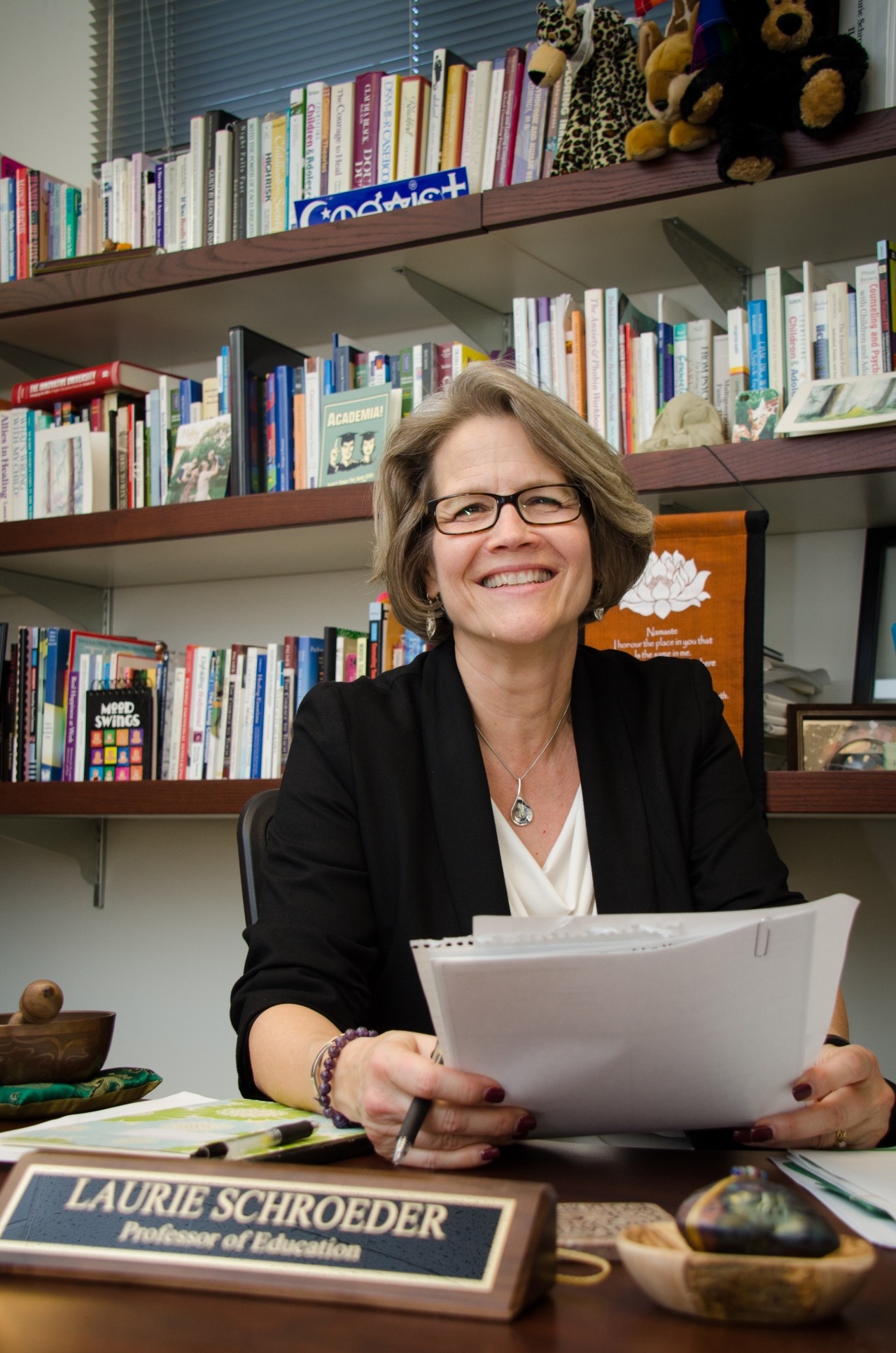
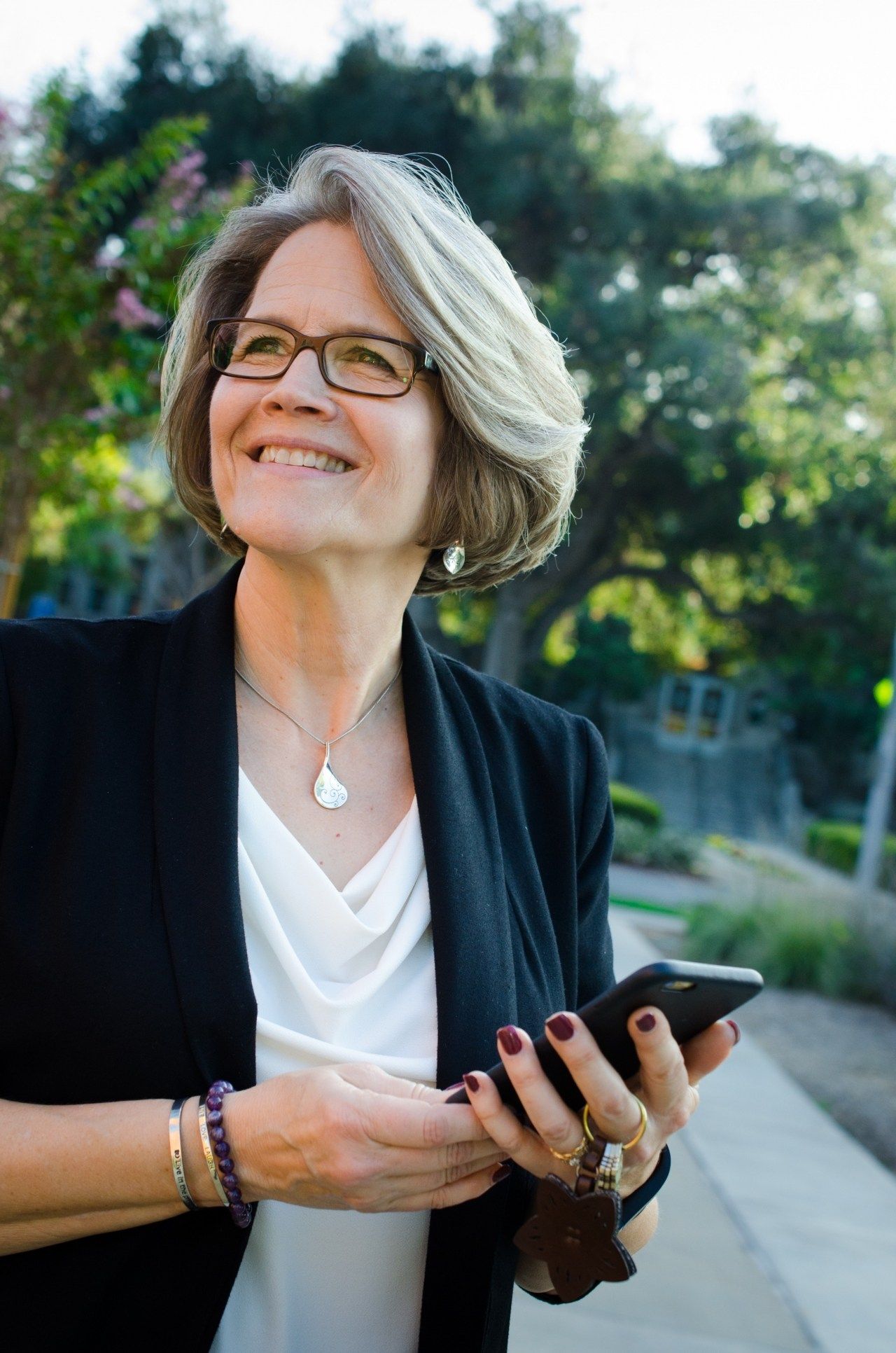
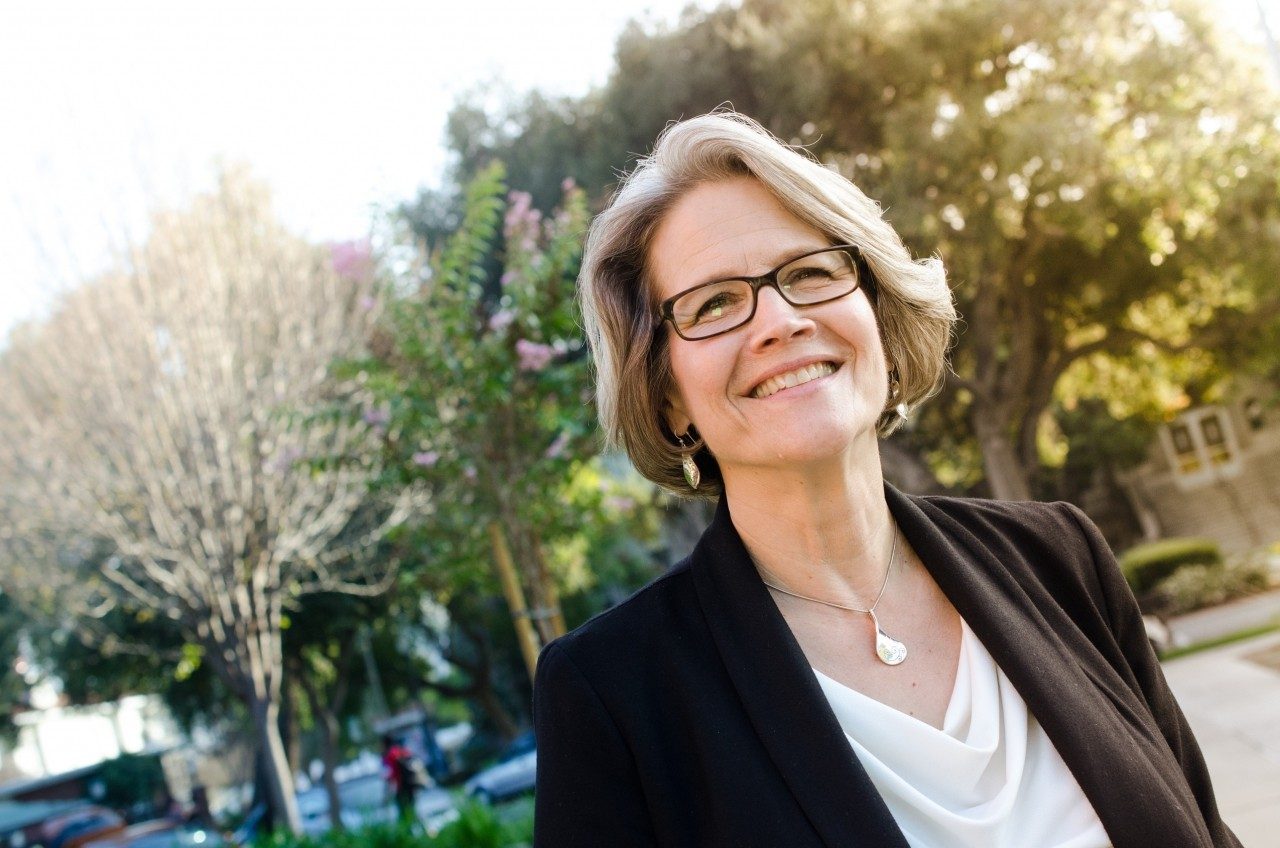
“These practices help improve focus and foster the ability of participants to be present in the moment, non-judgmentally and engage more fully with themselves and others,” she said. “That is why I am an active participant in the ongoing development of mindfulness as a university–wide focus at the La Verne campus community.”
“Mindfulness” has been a trending topic lately, as more people attribute it as a great way to beat stress, stay balanced and perform better on the job. In fact, this practice has even started taking place in elementary schools, as a way to help children stay more focused on their studies.
At its core, mindfulness is about staying rooted in the present moment, by quieting the mind through meditation. For Dr. Schroeder, it is simply how she lives her life.
Growing up in South Pasadena, Dr. Schroeder was the second of six children. Her parents were hard workers and when she graduated from high school, she received a full scholarship to the University of Southern California (USC). She was the first person in her family to attend college.
She stayed one year. “I met my husband, we were engaged, and I was going to get married,” she remembered. “It’s funny, no one ever tried to stop me from dropping out of USC or told me that I could be married and finish school. Instead, everyone was thrilled that I had met such a nice guy.
“Now, don’t get me wrong, my husband Larry and I will be celebrating our 43-year anniversary this year so yes, he is a great guy, but that really is not the point.”
Dr. Schroeder describes herself as someone who thinks of the bigger picture and connects that as another reason she did not feel connected to her first college experience. “I did not really have a vision of myself as part of the bigger world or a sense of my possibilities when I was 18,” she said.
It was the birth of her first child, Twilight, that connected Dr. Schroeder to her place in the world, first as seen through her daughter’s eyes, but then how she began to see herself. “I realized how powerful I was and I gained confidence in what I could do.” She started teaching childbirth classes, early pregnancy classes and working with couples through their pregnancies, doing birth visualization work and working with couples from all backgrounds and faiths. In time, she started working with a doctor and created an entire childbirth education program for a hospital.
At the same time, she went back to school. Thinking she had to complete her undergraduate degree, Dr. Schroeder went to Pacific Oaks College in Pasadena. She learned of a MA ABLE program offered, where essentially, one has to show the body of their work and experience in the world is equivalent to a bachelor’s degree.
Dr. Schroeder underwent the rigorous process, where she met all requirements and was accepted into a Master of Arts program, where her passion working with couples during pregnancies sparked her interest in becoming a Marriage and Family Therapist.
She completed her master’s degree, while working full-time and raising three children with Larry. Once she received her license, she opened her own practice, offering counseling services to families. She also worked with school districts managing counseling interns and trainees who were sent to different school sites to work with children.
“I saw the challenges were real for these kids, and I just became pulled in to work with them more,” she said. “So, I decided to go back to school and get my credential in school counseling.”
That decision brought her to the University of La Verne. She earned her Pupil Personnel Services credential, worked as an adjunct professor and was eventually hired full time in the College of Education & Organizational Leadership.
“Once I was hired, I knew I needed to begin a Ph.D. program,” Dr. Schroeder said, smiling. “I had my MA, my credential and there I was thinking of a doctorate degree. It was never a goal in my life until that moment, but once I set my mind to do something, I finish it.”
Indeed, she finished her Ph.D. in Education at Claremont Graduate University in just three years.
“My research agenda is focused on two areas: the efficacy of social emotional learning and mindfulness practices and its impact on student academic success,” she said. “And, working to create classroom environments that promote emotional well-being for students and their teachers as well as training school counselors to be engaged social agents.”
Dr. Schroeder has worked at the University of La Verne for 15 years. During that time, she spent seven years as Program Chair for the Educational Counseling and Pupil Personnel Services Credential Program and has served as Department Chair of Advanced Studies in Education and Human Development since 2009. Her background also includes serving as a Cultivating Awareness and Resilience in Education (CARE) Facilitator, where she works to help educators provide social, emotional and instructional support to their students.
Her experience working with school districts and seeing her La Verne students work at various school sites as well as her tenure working as a director and clinical supervisor at a community center in Monrovia, showed her the growing need for student counseling services in underprivileged communities.
“There needed to be a mindful focus on developing ways to serve all the students and their families, and that meant bilingually, too. If we know the primary language spoken at home for a large number of students at a particular school is Spanish, then we have a responsibility to provide information and communicate with students and families in Spanish, especially in crisis situations. We needed to do better.”
A former classmate of hers at CGU, Associate Professor of Education Dr. Adonay Montes, shared this same vision. Together, they worked together to apply for Title V funding to create La Verne’s Spanish Bilingual Bicultural Counseling Certificate, which is now offered as a concentration at La Verne and is the only program like it offered in California.
“The Bilingual Bicultural Certificate is of great significance to our profession as it provides future school counselors with specific skills they can use to work effectively with Latino/a students and families,” said Dr. Montes, who attributed the successful implementation of the program to Dr. Schroeder’s leadership.
“Laurie is an effective leader because she leads with compassion,” he said. “She is the type of individual who identifies the strengths of those she leads and is able to establish the collaboration necessary to move innovative and important programs to the next level.”
Dr. Schroeder considers the implementation of the certificate one of her proudest moments at La Verne.
When asked what has allowed her to find the balance in her home and work life, while she works tirelessly at whatever her current life goal is, she sits back and takes a breath.
“Perhaps for me, it’s about being OK with what I am doing and why I am doing it. It is about having a profound trust in myself and my instincts. It took time to build that confidence, and I savor it. I also know that in order to do anything well, one needs to be able to focus and be mindful — that’s the power of staying open in the moment.”
